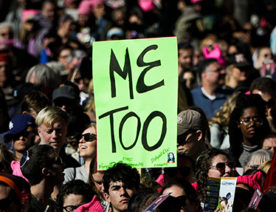
Americans support the Equal Rights Amendment and think it would be beneficial for the country and American women in particular. Many think women have fewer opportunities than men in the workplace and in politics. Forty-five percent see the recent attention on sexual misconduct as advantageous for women, while 30% think it’s having a negative impact.
On January 27, 2020, Virginia became the 38th state to ratify the Equal Rights Amendment1, the constitutional guarantee of legal rights regardless of sex. However, a deadline for three-quarters, or 38, of the 50 states to approve the ERA expired in 1982.
Seventy-three percent favor the ERA, including 70% of men and 76% of women. Democrats, regardless of gender, strongly favor the amendment. Among Republicans, 37% of men strongly favor, along with 50% of women. Support for the ERA is high even though 72% of Americans mistakenly think women and men are already explicitly guaranteed equal rights by the United States Constitution. Currently, the Constitution only guarantees equal rights for the right to vote.
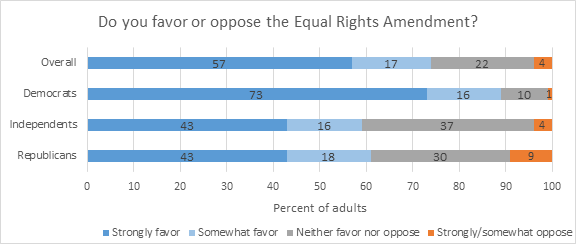
Question: Do you favor, oppose, or neither favor nor oppose the Equal Rights Amendment, also known as the ERA, which is the proposed constitutional amendment that would guarantee equal rights for men and women under the law?Source: AP-NORC poll conducted January 16-21, 2020 with 1,353 adults nationwide.
About half of Americans say the ratification of the ERA would be helpful for the country as a whole and a majority think it will help women in particular. The impact for men in general is expected to be neither negative nor positive. Forty percent of women say the amendment would have a positive impact on them personally.
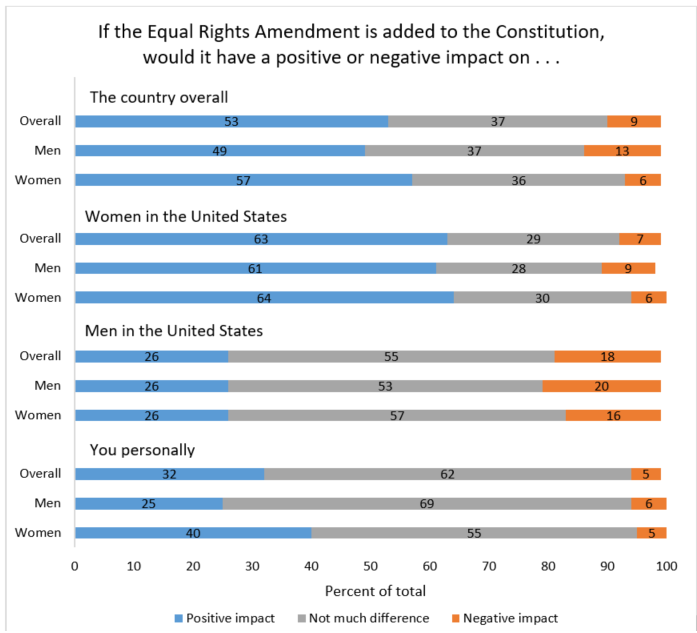
Question: If the Equal Rights Amendment is ratified and added to the U.S. Constitution, do you think it would have a positive impact or negative impact on each of the following, or wouldn’t it make much difference?Source: AP-NORC poll conducted January 16-21, 2020 with 1,353 adults nationwide.
Although Congress passed the amendment in 1972, it set a 1982 deadline to reach the approval of three-quarters of states required for ratification. Sixty-nine percent say discrimination against women has decreased over those 50 years, but many say women still have fewer opportunities than men in politics and the workplace.
According to the U.S. Census2, women earn about 80% of what men do, and just 7% of Fortune 500 CEOs3 are women. More than 4 in 10 Americans think women have fewer opportunities for high paying jobs and career advancement, including more than half of women.
The 116th Congress, elected in 2018, includes the highest percentage of women in U.S. history4, with 23% of seats in the House of Representatives and 26% of seats in the Senate filled by women. Thirty-nine percent of Americans say women have fewer opportunities in politics or running for office than men, down from 53% in 2016.5
The U.S. Census6 reports that educational attainment for men and women is about equal. And most Americans say men and women have about the same prospects for a quality education.
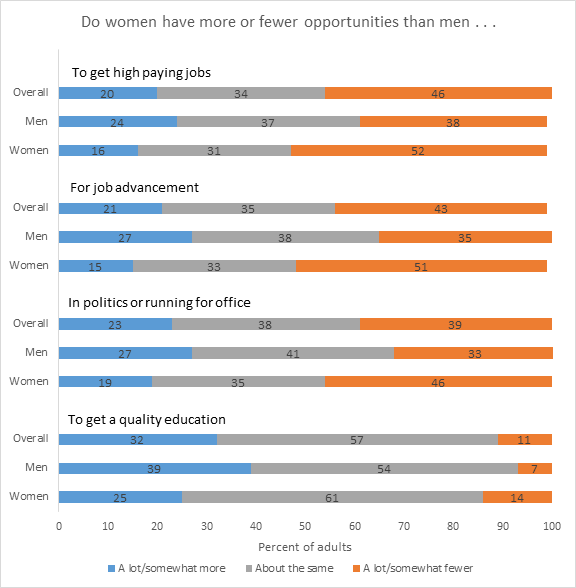
Question: For each of the following, do you think women have more opportunities than men, about the same amount of opportunities, or fewer opportunities than men? Source: AP-NORC poll conducted January 16-21, 2020 with 1,353 adults nationwide.
Forty-three percent of the women surveyed report experiencing at least some type of job-related discrimination, either getting a job or receiving equal pay because of their gender. Nineteen percent of men report having been discriminated in either of these ways because of their gender.
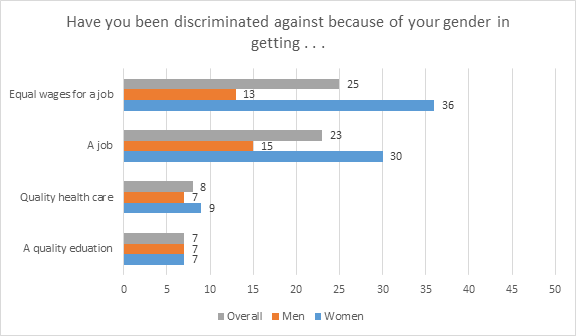
Question: Have you yourself ever been discriminated against because of your gender in getting… Source: AP-NORC poll conducted January 16-21, 2020 with 1,353 adults nationwide.
More than two years ago, allegations about sexual misconduct by powerful men garnered public attention. While few Americans see the recent spotlight given to sexual misconducted as affecting them personally, 45% say it has had a positive effect on American women, and a third regard it as a positive for the United States as a whole. However, nearly half say it has a negative impact on men and 30% see it as a negative for women.
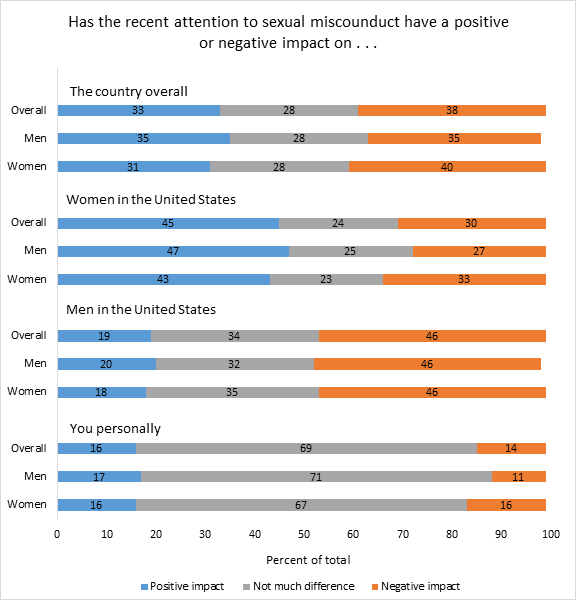
Question: Would you say the recent attention to sexual misconduct in the United States has generally had a positive impact or negative impact on each of the following, or has it not had much impact? Source: AP-NORC poll conducted January 16-21, 2020 with 1,353 adults nationwide.
The nationwide poll was conducted January 16-21, 2020, using the AmeriSpeak® Panel, the probability-based panel of NORC at the University of Chicago. Online and telephone interviews using landlines and cell phones were conducted with 1,353 adults. The margin of sampling error is plus or minus 3.6 percentage points.
- https://apnews.com/fd7f31ce50bc15184317d1abefb08da1
- https://www.census.gov/library/publications/2019/demo/p60-266.html
- https://fortune.com/2019/05/16/fortune-500-female-ceos/
- https://apnews.com/29aaeb8ed7a043d28c7c2f384cea1725
- https://apnorc.org/projects/hillary-clintons-candidacy-and-the-state-of-gender-discrimination-in-the-united-states/
- https://www.census.gov/content/dam/Census/library/publications/2016/demo/p20-578.pdf

